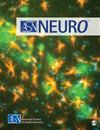Transcriptional Fingerprint of Hypomyelination in Zfp191null and Shiverer (Mbpshi) Mice
IF 3.9
4区 医学
Q2 NEUROSCIENCES
引用次数: 11
Abstract
The transcriptional program that controls oligodendrocyte maturation and central nervous system (CNS) myelination has not been fully characterized. In this study, we use high-throughput RNA sequencing to analyze how the loss of a key transcription factor, zinc finger protein 191 (ZFP191), results in oligodendrocyte development abnormalities and CNS hypomyelination. Using a previously described mutant mouse that is deficient in ZFP191 protein expression (Zfp191 null ), we demonstrate that key transcripts are reduced in the whole brain as well as within oligodendrocyte lineage cells cultured in vitro. To determine whether the loss of myelin seen in Zfp191 null mice contributes indirectly to these perturbations, we also examined the transcriptome of a well-characterized mouse model of hypomyelination, in which the myelin structural protein myelin basic protein (MBP) is deficient. Interestingly, Mbp shi (shiverer) mice had far fewer transcripts perturbed with the loss of myelin alone. This study demonstrates that the loss of ZFP191 disrupts expression of genes involved in oligodendrocyte maturation and myelination, largely independent from the loss of myelin. Nevertheless, hypomyelination in both mouse mutants results in the perturbation of lipid synthesis pathways, suggesting that oligodendrocytes have a feedback system that allows them to regulate myelin lipid synthesis depending on their myelinating state. The data presented are of potential clinical relevance as the human orthologs of the Zfp191 and MBP genes reside on a region of Chromosome 18 that is deleted in childhood leukodystrophies.Zfp191null和Shiverer (Mbpshi)小鼠髓鞘退化的转录指纹图谱
控制少突胶质细胞成熟和中枢神经系统(CNS)髓鞘形成的转录程序尚未完全表征。在这项研究中,我们使用高通量RNA测序来分析锌指蛋白191 (ZFP191)这一关键转录因子的缺失是如何导致少突胶质细胞发育异常和中枢神经系统低髓鞘形成的。使用先前描述的ZFP191蛋白表达缺陷的突变小鼠(ZFP191无效),我们证明了全脑以及体外培养的少突胶质细胞谱系细胞中的关键转录物减少。为了确定在Zfp191缺失小鼠中观察到的髓磷脂缺失是否间接导致了这些扰动,我们还检查了表征良好的低髓鞘化小鼠模型的转录组,其中髓鞘结构蛋白髓鞘碱性蛋白(MBP)缺乏。有趣的是,Mbp shi(哆嗦)小鼠的转录本受到髓磷脂缺失的干扰要少得多。这项研究表明,ZFP191的缺失会破坏参与少突胶质细胞成熟和髓鞘形成的基因的表达,而这些基因在很大程度上与髓鞘的缺失无关。然而,两种小鼠突变体的低髓鞘形成导致脂质合成途径的扰动,这表明少突胶质细胞有一个反馈系统,允许它们根据其髓鞘形成状态调节髓磷脂脂质合成。所提供的数据具有潜在的临床相关性,因为Zfp191和MBP基因的人类同源物位于18号染色体的一个区域,该区域在儿童白质营养不良症中被删除。
本文章由计算机程序翻译,如有差异,请以英文原文为准。
求助全文
约1分钟内获得全文
求助全文
来源期刊

ASN NEURO
NEUROSCIENCES-
CiteScore
7.70
自引率
4.30%
发文量
35
审稿时长
>12 weeks
期刊介绍:
ASN NEURO is an open access, peer-reviewed journal uniquely positioned to provide investigators with the most recent advances across the breadth of the cellular and molecular neurosciences. The official journal of the American Society for Neurochemistry, ASN NEURO is dedicated to the promotion, support, and facilitation of communication among cellular and molecular neuroscientists of all specializations.
 求助内容:
求助内容: 应助结果提醒方式:
应助结果提醒方式:


